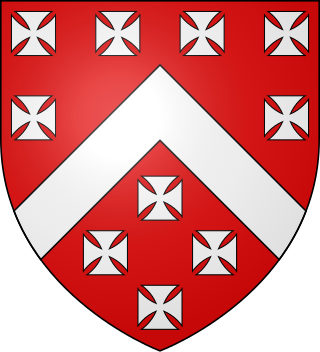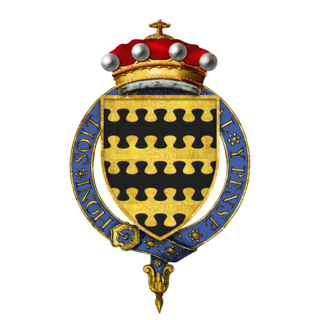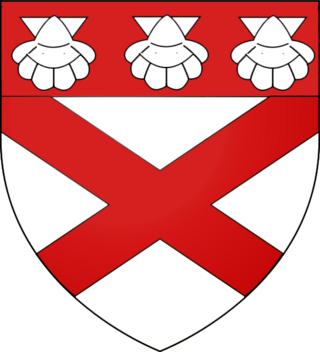
Baron Berners is a barony created by writ in the Peerage of England.

The title Baron Berkeley originated as a feudal title and was subsequently created twice in the Peerage of England by writ. It was first granted by writ to Thomas de Berkeley, 1st Baron Berkeley (1245–1321), 6th feudal Baron Berkeley, in 1295, but the title of that creation became extinct at the death of his great-great-grandson, the fifth Baron by writ, when no male heirs to the barony by writ remained, although the feudal barony continued. The next creation by writ was in 1421, for the last baron's nephew and heir James Berkeley. His son and successor William was created Viscount Berkeley in 1481, Earl of Nottingham in 1483, and Marquess of Berkeley in 1488. He had no surviving male issue, so the Marquessate and his other non-inherited titles became extinct on his death in 1491, whilst the barony passed de jure to his younger brother Maurice. However, William had disinherited Maurice because he considered him to have brought shame on the noble House of Berkeley by marrying beneath his status to Isabel, daughter of Philip Mead of Wraxhall, an Alderman and Mayor of Bristol. Instead, he bequeathed the castle, lands and lordships comprising the Barony of Berkeley to King Henry VII and his heirs male, failing which to descend to William's own rightful heirs. Thus on the death of King Edward VI in 1553, Henry VII's unmarried grandson, the Berkeley inheritance returned to the family. Therefore, Maurice and his descendants from 1492 to 1553 were de jure barons only, until the return of the title to the senior heir Henry, becoming de facto 7th Baron in 1553. Upon his death he was succeeded by his relative George Harding.

William Blount, 4th Baron Mountjoy, KG, of Barton Blount, Derbyshire, was an extremely influential English courtier, a respected humanistic scholar and patron of learning. He was one of the most influential and perhaps the wealthiest English noble courtier of his time. Mountjoy was known internationally as a humanist writer and scholar and patron of the arts.

Sir Marmaduke Constable of Flamborough, Yorkshire, was a courtier and soldier during the reigns of Richard III, Henry VII and Henry VIII.

The Berkeley family is an ancient English noble family. It is one of only five families in Britain that can trace its patrilineal descent back to an Anglo-Saxon ancestor. The Berkeley family retains possession of much of the lands it held from the 11th and 12th centuries, centred on Berkeley Castle in Gloucestershire, which still belongs to the family.

Thomas de Berkeley, 1st Baron Berkeley, The Wise, feudal baron of Berkeley, of Berkeley Castle in Gloucestershire, England, was a peer, soldier and diplomat. His epithet, and that of each previous and subsequent head of his family, was coined by John Smyth of Nibley (d.1641), steward of the Berkeley estates, the biographer of the family and author of "Lives of the Berkeleys".

Thomas Wentworth, 1st Baron Wentworth and de jure6th Baron le Despencer, PC was an English peer and courtier during the Tudor dynasty.

Sir William Kingston, KG was an English courtier, soldier and administrator. He was the Constable of the Tower of London during much of the reign of Henry VIII. Among the notable prisoners he was responsible for was Queen Anne Boleyn, as well as the men accused of adultery with her. He was MP for Gloucestershire in 1529 and 1539.

Sir Philip Wentworth of Nettlestead, Suffolk was an English knight and courtier. Wentworth was a great-grandfather of Queen Jane Seymour, third wife of King Henry VIII. He was beheaded at Middleham, Yorkshire.

Gilbert Tailboys or Talboys, 1st Baron Tailboys of Kyme was an English courtier and Member of Parliament during the reign of Henry VIII of England.
Edward Burgh, 2nd Baron Burgh of Gainsboroughde jure 4th Baron Strabolgi, was an English peer.
Margaret Gascoigne was an English noblewoman, the daughter of Henry Percy, 3rd Earl of Northumberland and Eleanor Poynings.

Sir Robert Throckmorton, KG, of Coughton Court in Warwickshire, was a Member of Parliament and a distinguished English courtier. His public career was impeded by remaining a Roman Catholic.

Henry FitzHugh, 3rd Baron FitzHugh KG of Ravensworth Castle in North Yorkshire, was an administrator and diplomat who served under Kings Henry IV and Henry V.

Sir William Denys of Dyrham, Gloucestershire, was a courtier of King Henry VIII and High Sheriff of Gloucestershire in 1518 and 1526. The surname is sometimes transcribed as Dennis.

Sir Richard Berkeley of Stoke Gifford, Gloucestershire was MP for Gloucestershire in 1604. He had previously served as Sheriff of Gloucestershire in 1564, and as Deputy Lieutenant of Gloucestershire. He was knighted by Queen Elizabeth I in 1568. In 1595 he was appointed Lieutenant of the Tower of London. In 1599 he was appointed custodian of Robert Devereux, 2nd Earl of Essex, who was kept under house arrest at Essex House in London. He died in 1604, whilst serving as MP, and was buried in The Gaunts Chapel, Bristol, where exists an effigy of him, which chapel had been founded in 1220 by Maurice de Gaunt, a member of the Berkeley family, and which stands opposite St Augustine's Abbey, founded by a member of the Berkeley family of nearby Berkeley Castle.

Sir Marmaduke Constable, of Everingham, Yorkshire, was an English soldier and Member of Parliament. He was the great-grandfather of the poet, Henry Constable, author of Diana, one of the first sonnet sequences in English.

Maurice Berkeley, de jure 3rd Baron Berkeley, of Thornbury in Gloucestershire, Maurice the Lawyer, was an English nobleman.

The title Baron Cobham has been created numerous times in the Peerage of England; often multiple creations have been extant simultaneously, especially in the fourteenth century.
Thomas Berkeley, 6th Baron Berkeley was an English peer and member of King Henry VIII's court.












